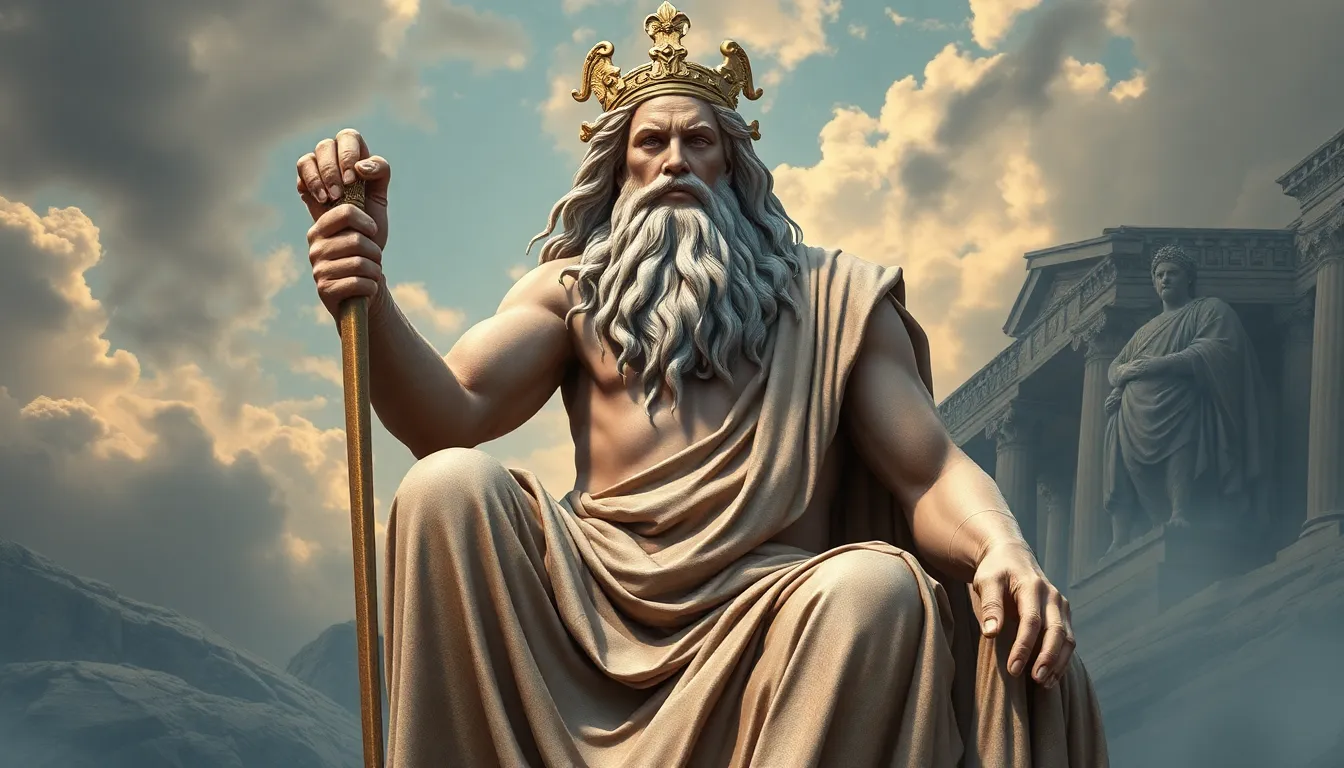The Role of Zeus: King of the Gods in the Greek Pantheon
I. Introduction
Greek mythology is a rich tapestry of stories, characters, and beliefs that have shaped the cultural landscape of ancient Greece and continue to influence modern society. At the center of this mythological universe stands Zeus, the king of the gods, whose authority and power have made him a pivotal figure in countless myths and legends. This article explores the multifaceted roles and attributes of Zeus, delving into his origins, relationships, and lasting influence.
II. Origins and Birth of Zeus
Zeus’s story begins with a prophecy that foretold the overthrow of his father, Cronus, the ruler of the Titans. Fearing this prophecy, Cronus swallowed each of his children at birth, but when Zeus was born, his mother Rhea devised a plan to save him. She hid Zeus in a cave on the island of Crete, while giving Cronus a stone wrapped in swaddling clothes to swallow instead.
As Zeus grew, he was nurtured by nymphs and fed on honey and milk. Upon reaching adulthood, he sought to liberate his siblings—Hestia, Demeter, Hera, Hades, and Poseidon—by tricking Cronus into regurgitating them. This act of defiance marked the beginning of the Titanomachy, a ten-year war between the Olympian gods and the Titans, ultimately leading to the victory of Zeus and his siblings.
The alliance among Zeus and his siblings was significant, as it established a new order among the gods, with Zeus emerging as the undisputed leader of Mount Olympus.
III. Zeus as the King of the Gods
As the king of the gods, Zeus played a crucial role in establishing order among the deities and ensuring justice within the cosmos. He presided over the council of gods on Mount Olympus, where important decisions were made regarding the fate of both gods and mortals.
- Hierarchy of Mount Olympus: Zeus’s authority was paramount, and he was often depicted as the ultimate arbiter in disputes among the gods.
- Decision-making: His judgments were considered final, and he wielded the power to enforce laws and punish those who defied them.
Zeus’s leadership was not merely about power; it was also about responsibility, as he was seen as the protector of the weak and the champion of justice.
IV. Zeus’s Attributes and Symbols
Zeus is often associated with several powerful symbols that underscore his might and authority. The most notable of these is the thunderbolt, which represents his control over the sky and weather.
- Thunderbolt: A symbol of his power, the thunderbolt was often depicted in art and literature as a weapon used to enforce justice.
- Eagle: The eagle, sacred to Zeus, symbolizes his authority and is often seen as his messenger.
- Oak Tree: The oak tree is another symbol associated with Zeus, representing strength and endurance.
In art and literature, Zeus is frequently portrayed as a regal figure, often with a beard and a strong physique, emphasizing his status as the king of the gods.
V. Zeus’s Relationships with Other Deities
Zeus’s relationships with other deities were complex and often fraught with conflict. His marriage to Hera, the goddess of marriage and family, was marked by numerous affairs with other goddesses and mortal women.
- Marriages and Affairs: Zeus’s infidelity led to many myths involving love, jealousy, and revenge, particularly from Hera.
- Fatherhood: Zeus fathered many notable children, including Athena, Apollo, Artemis, Hermes, Persephone, and Hercules, each of whom played significant roles in various myths.
- Interactions with Olympian Gods: Zeus maintained a complicated relationship with other Olympian gods, often mediating disputes and enforcing his authority.
VI. Zeus’s Influence on Humanity
Zeus’s influence extended beyond the realm of gods; he was also a protector of humanity. As the god of justice, he was believed to oversee the moral order of the universe and ensure that mortals received their due.
- Protector of Mortals: Many myths illustrate how Zeus intervened in human affairs, rewarding the virtuous and punishing the wicked.
- Myths of Interaction: Stories such as the tale of Prometheus, who stole fire for humanity, depict Zeus as a figure who both aids and punishes mortals.
- Cultural Impact: Zeus played a significant role in ancient Greek culture, influencing religion, art, and literature, and serving as a symbol of authority and justice.
VII. The Evolution of Zeus’s Character
The portrayal of Zeus has evolved significantly over time, reflecting changes in societal values and philosophical thought. In early myths, Zeus is often depicted as a more capricious figure, while later literature presents him as a more benevolent ruler.
- Changes in Portrayal: From a powerful and often vengeful deity in early stories to a more measured and just god in classical literature.
- Influence of Philosophy: Philosophers like Plato and Aristotle contributed to a more nuanced understanding of Zeus, emphasizing his role as a moral and just figure.
- Modern Interpretations: Today, Zeus is often seen through various lenses, from literature and film to popular culture, highlighting his enduring relevance.
VIII. Conclusion
Zeus’s role in Greek mythology is multifaceted, encompassing aspects of power, justice, and authority. As the king of the gods, he not only governed the divine realm but also influenced human affairs, embodying the ideals of leadership and morality. His legacy continues to resonate in contemporary culture, reminding us of the importance of understanding mythological figures and their significance in shaping human thought and society.
In reflecting on Zeus’s enduring impact, we gain insight into the values and beliefs of ancient Greece, as well as the timeless themes of power, justice, and the complexities of human relationships.




